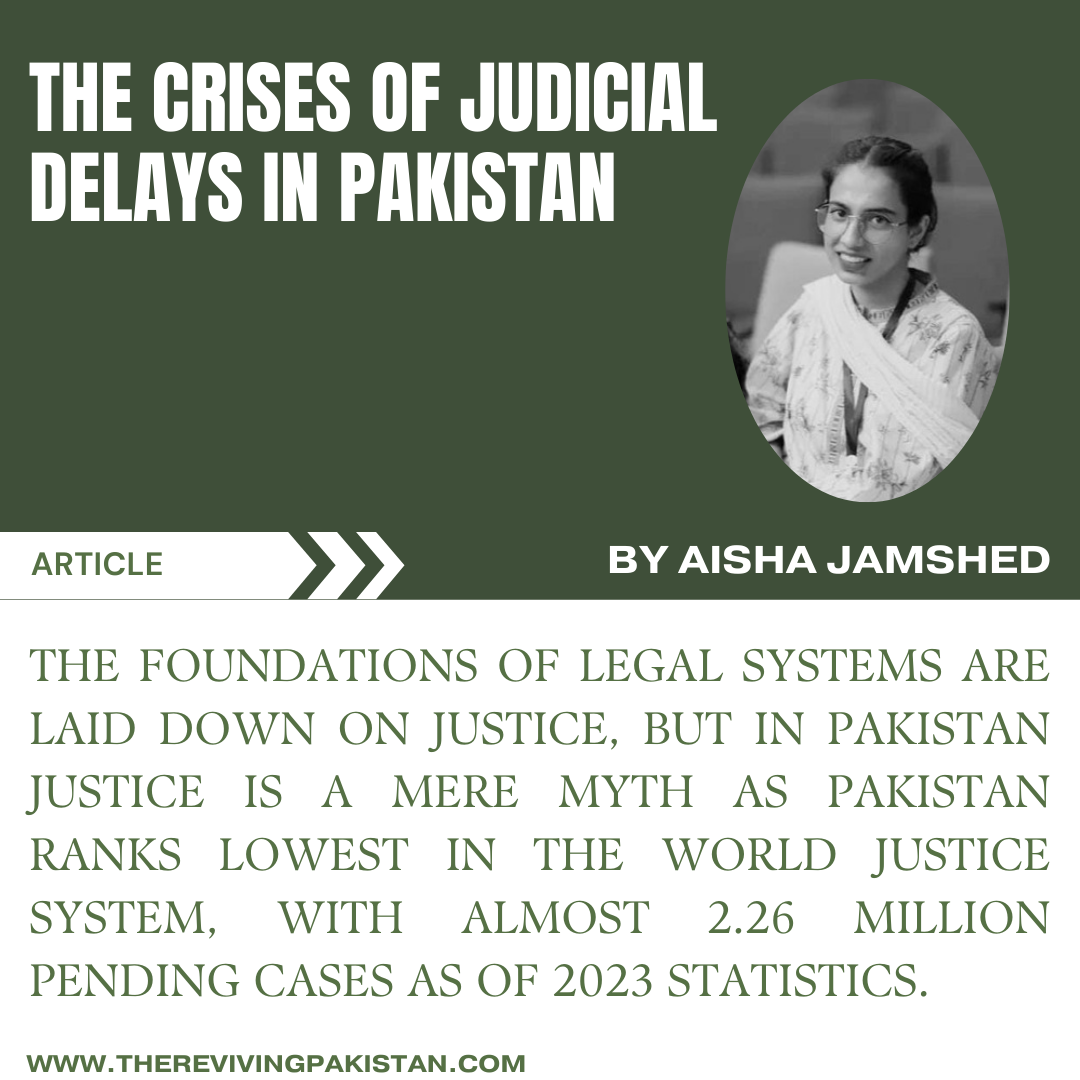Table of Contents
About the Author(s)

Aisha Jamshed
Aisha Jamshed is 20 and a sophomore-year law student at Hamdard School of Law. She aims to highlight the social issues thriving in Pakistani society which are often eclipsed and go unnoticed by more prominent issues.
Introduction:
The foundations of legal systems are laid down on justice, but in Pakistan justice is a mere myth as Pakistan ranks lowest in the World Justice System, with almost 2.26 million pending cases as of 2023 statistics. Access to justice in Pakistan is impeded by a number of factors ranging from procedural flaws to deeply enrooted corruption. Due to continuous filing of cases the backlog of pending cases remains high. The increasing backlog of cases each passing day makes it evident that it’s the denial of justice.
The 2023 report reveals that at the district judiciary level 1.86 million cases are pending, while 0.39 million cases are pending at the upper tier including the Supreme Court, Federal Shariat Court, and High Courts. In High Courts, civil cases constitute 81% while criminal cases constitute 19% of pending cases. At district judiciary level, civil cases constitute 64% while the criminal pending cases constitute 36%1.
Impact of Judicial Delays:
When Article 10 A gives an accused a right to a fair trial it is also an accused right to get a speedy trial or a reasonably expeditious trial. However, in criminal cases, a pendency in proceedings restrains the accused of their rights. In addition to this, not only the accused rights are denied but the victims’. Delays in proceedings often lead to loss of evidence, particularly eyewitness testimonies which ultimately lessen the chances of convictions2. The case of Mazhar Farooq3 where he was convicted of murder, was ordered to be released by the Supreme Court due to weak evidence after 24 years, evidently showing that delays are a chronic and sustainable part of Pakistan’s legal system. The undue delays in civil proceedings cause “symbiotic harms” to litigants and their families contributing to strained familial relationships, isolation from the community, impact on the mental health of litigants, and disruptions in the social development of their children.
It is further shown through research that one of the significant impacts that delayed justice causes is diminished public confidence as justice seems inaccessible and people involved in cases if belong to grassroot communities of Pakistan, find it inessential to be a part of prolonged and financially draining legal battle.
Causes of Judicial Delays:
The multi-faceted delays in judicial proceedings can be attributed from a number of factors including: overwhelming backlog of cases, procedural flaws, judicial transfers, delays in investigation, unnecessary adjournments, and finally but most importantly corruption.
The sheer volume of cases which are under trial hampers the judicial proceedings. The backlog of cases remains the primary factor, as more than two million cases are under trial; new cases already mark their places in an already existing sequence where a trial can take a decade or more to be adjudicated.
The legal procedures are either flawed or outdated causing unnecessary delays. Procedures are complex lengthy and complicated, like extensive documentation, and multiple levels of appeals. The practice of requesting adjournment is quite common and is often done in pursuit of financial gains rather than seeking justice4. One of the most frequent causes of adjournments is also the absence of prosecution witnesses.
The Pakistani courts lack in resources, including insufficient court facilities, mismanagement, and insufficient number of judges. The transfer and placement of judges furthur slow down the proceedings as each judge has to go through the same documents from the beginning to get familiarised with the cases5.
Inefficiencies by the police also hinder the procedures of investigation. According to the judgements of 2019 MLD 1139 and 2005 PCr.LJ 384, it can be seen that the police often fail to submit police reports or challan on time, which ultimately becomes the impediment in initiating the trial6. Police misconduct during the investigatory stage which includes improper evidence handling, procedural violations, and insufficient coordination with prosecutors, results in extended investigations,and prolonged and delayed court processes7.
Conclusion and Recommendations;
“Court cannot, legally and morally, take the excuse of ‘rush of work’. Not a single decision of a court of law should reflect that it was not a ‘decision’ but an attempt to earn ‘numbers/units’ or to lessen the number of cases entrusted to it for disposal ‘according to law’. Thin line between two known legal maxims i.e. ‘justice delayed is justice denied’ and ‘justice hurried is justice buried’ must always be appreciated by every single court.” (2015 SCMR 1549)
The above-stated judgment of the Supreme Court has referred to two legal maxims that are the extreme opposites of each other. Court referring to these two indicates that the justice should be delivered in a way that neither it is carried out hurriedly nor it is delayed in a way that denies the rights of litigants involved. It is also factual that the lengthy lawsuit procedures require a reasonable time, and the police and courts also need a reasonable time to investigate the cases. Hence the concept of judicial delays does not refer to the hasty disposal of cases to lessen the volume of cases but fair timely trial. Referring to the case of Muhammad Anar8 where the Supreme Court acquitted the accused of all charges after 11 years, clearly depicts how necessary are fair expeditious to the people under trial.
In drawing the topic to the conclusion, mitigating judicial delays requires a multipronged approach. The procedural laws namely Cr.P.C and C.P.C that are followed in Pakistan’s legal system are over a century old, made in the colonial era and they need to be amended to align them with the modern era. Delays in investigations contribute to the lack of justice, simpler laws and procedures are needed for judicial reforms since complex laws and procedures cause justice to be delayed9. Exceptional financial sanctions should be enforced to prevent the initiation of pointless legal action10. The approach to ADR can help minimize delays as it streamlines processes, ADR is also less costly than litigation can contribute to expeditious processes, and takes less time compared to conventional court proceedings11
References:
1DAWN.COM. (2024, February 16). July-Dec 2023 statistics show 2.26 million cases pending in courts: report. DAWN.COM. https://www.dawn.com/news/1814586
2Ali, S., & Sadia, H. A. (2022). Analyzing the Adverse Effects of Delay in the Administration of Criminal Justice System in Pakistan. In Bahria University Law School, Pak. Journal of Int’L Affairs (Vol. 5, Issue 2, pp.1746–1748). https://pjia.com.pk/
3Iqbal, N. (2016, December 3). Death-row convict found not guilty — after 24 years. DAWN.COM. https://www.dawn.com/news/1298706
4Muhammad, Imran., Rao, Qasim, Idrees., Mohammad, Saeed. (2024). Pendency of Cases in Pakistan: Causes and Consequences. https://typeset.io/papers
5Danziger, S., Levav, J., & Avnaim-Pesso, L. (2011). Extraneous factors in judicial decisions. Proceedings of the National Academy of Sciences, 108(17), 6889–6892. https://doi.org/10.1073/pnas.1018033108
6Police, criminal trial and miscarriage of justice. (2023, October 16). Pakistan Today. https://www.pakistantoday.com.pk
7Andrew, L‐T, Choo. (2008). Abuse of Process and Judicial Stays of Criminal Proceedings. https://typeset.io/ 8Iqbal, N. (2016, December 3). Another death-row convict acquitted after 11 years in jail. DAWN.COM. https://www.dawn.com/news/1300177
9Muhammad Imran , Rao Qasim Idrees , Muhammad Arif Saeed. (2024). Pendency of Cases in Pakistan: Causes and Consequences. iRASD Journals. https://journals.internationalrasd.org/
10Bilal, M., & Khokhar, F. (2021). Justice delayed or denied: The myth of justice in Pakistan. Journal of Law & Social Studies, 3(2), 124–132. https://doi.org/10.52279/jlss.03.02.124132
11Samza, Fatima., Syed, Kaleem, Imam. (2022). Alternative Dispute Resolution: A Panacea for Retrieval of Expeditious Justice in Pakistan. Global legal studies review, VII(IV):29-38. doi: 10.31703/glsr.2022(vii-iv).05. https://typeset.io/papers/

